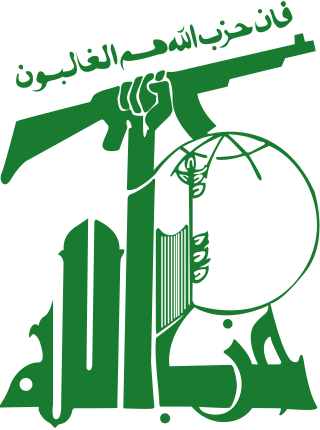
Hezbollah is a Lebanese Shia Islamist political party and militant group, led since 1992 by its Secretary-General Hassan Nasrallah. Hezbollah's paramilitary wing is the Jihad Council, and its political wing is the Loyalty to the Resistance Bloc party in the Lebanese Parliament.

The Lebanese Civil War was a multifaceted armed conflict that took place from 1975 to 1990. It resulted in an estimated 150,000 fatalities and also led to the exodus of almost one million people from Lebanon.

The Quds Force is one of five branches of Iran's Islamic Revolutionary Guard Corps (IRGC) specializing in unconventional warfare and military intelligence operations. U.S. Army's Iraq War General Stanley McChrystal describes the Quds Force as an organization analogous to a combination of the CIA and the Joint Special Operations Command (JSOC) in the United States. Responsible for extraterritorial operations, the Quds Force supports non-state actors in many countries, including Hezbollah, Hamas, Palestinian Islamic Jihad, Yemeni Houthis, and Shia militias in Iraq, Syria, and Afghanistan. According to Michael Wigginton et al., the Al-Quds Force is "a classic example of state-sponsored terrorism."
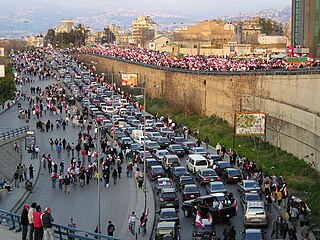
The Syrian occupation of Lebanon began in 1976, during the Syrian intervention in the Lebanese Civil War, and ended on April 30, 2005, after the Cedar Revolution and several demonstrations in which most of the Lebanese people participated. The withdrawal agreement was signed by President Bashar al-Assad and Saad Hariri, son of Rafic Hariri, whose assassination triggered the series of events leading to the withdrawal.

Hezbollah, is a Lebanese Shia Islamist political party and militant group, has an exceptionally strong military wing, thought to be stronger than the Lebanese Army, and equivalent to the armed strength of a medium-sized army. A hybrid force, the group maintains "robust conventional and unconventional military capabilities", and is generally considered to be the most powerful non-state actor in the world.
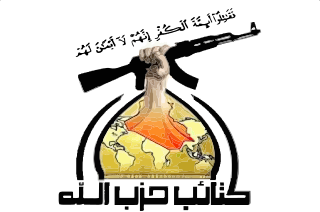
Kata'ib Hezbollah or the Hezbollah Brigades, is a radical Iraqi Shiite paramilitary group which used to be part of the Iraqi Popular Mobilization Forces (PMF), staffing the 45th, 46th, and 47th Brigades. During the Iraq War (2003–11), the group fought against Coalition forces. It has been active in the War in Iraq (2013–2017) and the Syrian civil war (2011–present). The group was commanded by Abu Mahdi al-Muhandis until he was killed in a US drone attack in 2020. Thereafter, he was replaced by Abdul Aziz al-Muhammadawi, as the new leader of the PMF. KH seeks to establish an Iran-aligned government in Iraq, expel American forces from the country, and advance the regional and international interests of Iran in Iraq and the region. The group is responsible for killing hundreds of U.S. soldiers and takes a central part in carrying out attacks against U.S. targets in Iraq and acts as part of the Axis of Resistance. Kata'ib Hezbollah has received extensive training, funding, logistic support, weapons, and intelligence from the Quds Force of Iran's Islamic Revolutionary Guard Corps (IRGC).
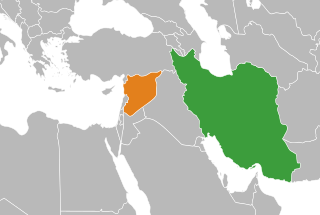
Syria and Iran are strategic allies. Syria is usually called Iran's "closest ally", with ideological conflict between the Arab nationalism ideology of Syria's secular ruling Ba'ath Party and the Islamic Republic of Iran's pan-Islamist policy notwithstanding. Iran and Syria have had a strategic alliance ever since the Iran–Iraq War, when Syria sided with non-Arab Iran against neighbouring Ba'ath-ruled Iraq. The two countries shared a common animosity towards then Iraqi president Saddam Hussein and coordination against the United States and Israel.
The Axis of Resistance is an informal Iran-led political and military coalition in West Asia and North Africa. It most notably includes the Syrian government, the Lebanese political party and militant group Hezbollah, the Yemeni political and military organization Ansar Allah, and a variety of Palestinian militant groups.

Foreign involvement in the Syrian civil war refers to political, military and operational support to parties involved in the ongoing conflict in Syria that began in March 2011, as well as active foreign involvement. Most parties involved in the war in Syria receive various types of support from foreign countries and entities based outside Syria. The ongoing conflict in Syria is widely described as a series of overlapping proxy wars between the regional and world powers, primarily between the United States and Russia as well as between Iran and Saudi Arabia.

The Iran–Israel proxy conflict, also known as the Iran–Israel proxy war or Iran–Israel Cold War, is an ongoing proxy conflict between Iran and Israel. In the Israeli–Lebanese conflict, Iran has Lebanese Shia militias, most notably Hezbollah. In the Israeli-Palestinian conflict, Iran has backed Palestinian groups such as Hamas. Israel has supported Iranian rebels, such as the People's Mujahedin of Iran, conducted airstrikes against Iranian allies in Syria and alleged to assassinate Iranian nuclear scientists. In 2018 Israelis forces directly attacked Iranian forces in Syria.

The Islamic Republic of Iran and the Syrian Arab Republic are close strategic allies, and Iran has provided significant support for the Syrian government in the Syrian civil war, including logistical, technical and financial support, as well as training and some combat troops. Iran sees the survival of the Syrian government as being crucial to its regional interests. When the uprising developed into the Syrian Civil War, there were increasing reports of Iranian military support, and of Iranian training of the National Defence Forces both in Syria and Iran. From late 2011 and early 2012, Iran's IRGC began sending tens of thousands of volunteers in co-ordination with the Syrian government to prevent the collapse of the Syrian Arab Army; thereby polarising the conflict along sectarian lines.

Following the outbreak of the protests of Syrian revolution during the Arab Spring in 2011 and the escalation of the ensuing conflict into a full-scale civil war by mid-2012, the Syrian Civil War became a theatre of proxy warfare between various regional powers such as Turkey and Iran. Spillover of the Syrian civil war into the wider region began when the Iraqi insurgent group known as the Islamic State of Iraq (ISI) started intervening in the conflict from 2012.

The Iranian intervention in Iraq has its roots in the post-2003 invasion of Iraq by the United States and allies when the infrastructure of the Iraqi armed forces, as well as intelligence, were disbanded in a process called "de-Ba'athification" which allowed militias with close ties to Tehran to join the newly reconstituted army.

Hezbollah involvement in the Syrian Civil War has been substantial since the beginning of armed insurgency phase of the Syrian Civil War in 2011, and evolved into active support for Ba'athist government forces and troop deployment from 2012 onwards. By 2014, Hezbollah was deployed across Syria. Hezbollah has also been very active in preventing Al-Nusra Front and Islamic State penetration into Lebanon, being one of the most active forces in the Syrian Civil War spillover in Lebanon.
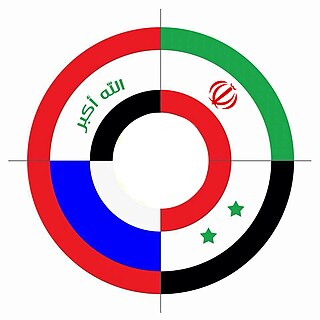
The Russia–Syria–Iran–Iraq coalition, also referred to as 4+1, is a joint intelligence-sharing cooperation between opponents of the Islamic State (IS) with operation rooms in Syria's Damascus and Iraq's Green Zone in Baghdad. It was formed as a consequence of an agreement reached at the end of September 2015 between Russia, the Islamic Republic of Iran, Iraq and the Syrian Arab Republic to "help and cooperate in collecting information about the terrorist Daesh group" (ISIL) with a view to combatting the advances of the group, according to the statement issued by the Iraqi Joint Operations Command. The statement also cited "the increasing concern from Russia about thousands of Russian terrorists committing criminal acts within ISIS."

Iran and Saudi Arabia are engaged in an ongoing struggle for influence in the Middle East and other regions of the Muslim world. The two countries have provided varying degrees of support to opposing sides in nearby conflicts, including the civil wars in Syria and Yemen; and disputes in Bahrain, Lebanon, Qatar, and Iraq. The struggle also extends to disputes or broader competition in other countries globally including in West, North and East Africa, South, Central, Southeast Asia, the Balkans, and the Caucasus.
Lebanon's role in the Syrian Civil War has been limited, compared to the role of other regional and international actors. While the Lebanese Republic has not been officially involved in the conflict, it has been greatly affected by it and some Lebanese factors have taken an active role in the Syrian War and its spillover into Lebanon.

The Baqir Brigade, named after Shia Imam Muhammad al-Baqir, is a Syrian loyalist militia originating in the Aleppo Governorate that fights in the Syrian Civil War. One of the most prominent and largest pro-government militias from the Aleppo area and part of the "Local Defence Forces" network, the Baqir Brigade mostly consists of tribesmen from the al-Baggara tribe that traditionally supported the rule of the al-Assad family despite being mostly Sunni Muslim. Though the militia's fighters thus come from a largely Sunni background, many of them have converted to or are at least strongly influenced by Shia Islam. Indeed, the Baqir Brigade has been noted for its strong connections to the Lebanese Hezbollah, Iran, and various Iraqi Shia militias, and is thus generally considered to be a Shia or "Shi'ified" fighting force.
Hezbollah–Syria relations have been a crucial aspect of Middle Eastern geopolitics, particularly since the onset of the Syrian Civil War. These relations are deeply intertwined with the broader regional power dynamics, involving Iran and its quest to maintain influence in the Levant through its allies. Hezbollah, a Shia Islamist political party and militant group based in Lebanon, has established itself as a significant force in the region with both military and political power.













